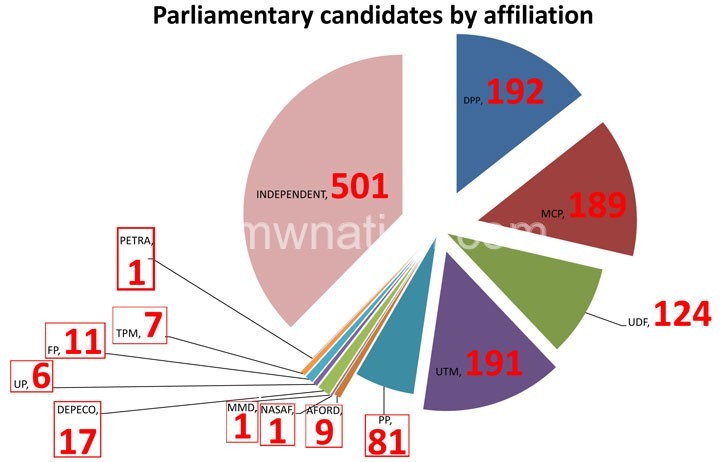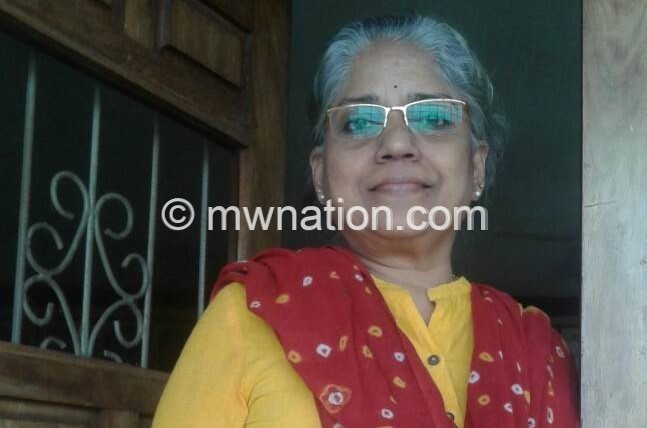Independents surge
- 501 this year, from 417 in 2014
- Female candidates’ numbers up 12%
Out of 1 333 candidates 501 will compete on an independent ticket in the forthcoming elections, an approved list of parliamentary candidates released by the Malawi Electoral Commission (MEC) shows.
The figure represents a 17 percent increase, from 417 that competed in 2014.

While reasons could vary for the surge, various research documents by renowned scholars, including international bodies, state that such a rise is a result of frustration by these candidates during primary elections in their parties.
In fact, ahead of the May 21 polls, almost all parties have been involved in primary election wrangles, with the Malawi Congress Party (MCP) mostly experiencing the problems in the Centre, Democratic Progressive Party (DPP) and United Democratic Front (UDF) in the South, while UTM has seen all regions in primary shambles.
The number of female contestants has soared from 268 in the 2014 to 304 this year, with 114 running as independents, representing an increase of 14 percent.

Since the 1994 elections, data shows a surge of independent MPs. While there was no independent legislator elected in the 1994 elections, four in 1999; 40 in 2004, 32 in 2009, as many as 52 independents made it to the 193-member Parliament in the 2014 elections.
Independents surge
In a 2017 report commissioned by the Norwegian Ministry of Foreign Affairs, governance and rights researcher Arne Tostensen suggested that the number of independent candidates is growing due to controversies surrounding primaries.
In the report, Malawi: A Political Economy Analysis, Tostensen observes that many aspirants who fail to secure nomination by their party—fairly or due to manipulation of the rules by the party leadership—decide to run as independents.
Blessings Chinsinga of Chancellor College adds in his Critical Stock Take of Malawi’s 19 May 2009 Elections, attributing the problem to what he terms as increasingly undemocratic candidate selection exercises.
“The choice of most candidates does not reflect the will of the electorate as much as it does that of the political party machines,” notes Chinsinga.
Further, Nandin Patel, a political expert corroborated in her Malawi’s 2009 Elections: A Critical Evaluation. While primary elections are supposed to be managed at the grassroots of the parties, Patel noted a visible interference and dominance from the party top brass.
“The pre-selection by the ‘inner circle’ form of nomination favours the incumbents and those candidates who have close personal links with the leadership, thereby leaving very limited or almost negligible space for other aspirants.
“In the 2004 general elections, the UDF resorted to a high level imposition of candidates with a disastrous effect in the elections,” she added.
Sadly, Patel noted that the DPP seemed not to have learnt from that mistake and repeated the tactic in the run up to the 2009 elections.
“A large number of aspirant DPP candidates protesting against the fraudulent conduct of primaries in many areas have emerged as a significant block of independent parliamentary candidates,” she added.
As Tostensen adds, in the 2014 elections, 27 percent of all legislators were independent of any party at the beginning of the term, although many returned to the fold later in the electoral cycle.
For Patel, the emergence of large numbers of independent parliamentarians is indicative of two things.
These are: “A weakening of party role at the constituency level on one hand, and poor vertical accountability and declining lack of public trust in MPs by the voters reflected in the turnover rate of incumbents, which was over 70 percent in 2009.”
Additionally, political scientists Happy Kayuni and Farai Chikadza, in their 2016 paper titled: The Gatekeepers: Political Participation of Women in Malawi observe that parties and their gatekeepers are critical to get more women into politics.
“The gatekeepers may promote as well as hinder candidature,” notes Patel.
Gender balance
The increase in female candidates could also be attributed to frustrations during primary elections, as well as the ongoing 50-50 campaign aimed at shoring up the number of female representation in elected positions.
While the ruling DPP has fielded 192 candidates across the country, 50 are women, UTM has 191 candidates of whom 43 are women. MCP has 29 women out of 189 candidates, while UDF has 21 women out of 124 candidates.
These results show that DPP has achieved a 26 percent women representation, UTM has 22 percent; MCP has 15 percent while UDF has 16 percent.
These statistics show that none of these parties has achieved the 50-50 mark, which the 50:50 campaign team is advocating, seeking to increase women’s political participation and election in the May 21 polls.
Team leader Viwemi Chavula said in an interview that political parties’ current rhetoric is devoid of tangible action.
“The main areas of concerns relate to the administration of the elections: machinations around the setting of time and venue of elections; lack of clarity in definition of legitimate delegates to vote in the elections,” he said.
From the first multiparty election in 1994, the highest point for women’s representation in Parliament was between 2009 and 2014, when they had a 22 percent share of the seats. From 10 parliamentarians in 1994, the number moved to 18 after the 1999 polls, then to 27 in 2004 and 43 in 2009.
However, the number tragically slumped to 16.6 percent in the May 2014 general elections as only 32 female candidates made it to Parliament. The problem runs across all four major parties. The ruling DPP had 31 female parliamentarians in 2009, but the number dropped to eight in 2014; MCP doubled its number from three in 2009 to six in 2014, but that figure is uninspiring given that the party had 50 parliamentarians.
In fact, out of 1 292 candidates vying for 193 parliamentary seats in 2014, only 257 were women and 44 constituencies had no female contestants, according to the 2015 Joint CSO—Cedaw (Convention on the Elimination of All forms of Discrimination Against Women) Shadow Report for Malawi.
Ahead of the May 21 polls, UDF secretary general Kandi Padambo believes it is high time Malawi moved from First-Past-the-Post (FPTP) system of electing leaders to the proportional representation to win the 50:50 campaign.
He said: “With proportional representation, people will be voting for political parties not individuals meaning that candidates would be anticipated to win elections despite the candidates being male or female.”
While DPP spokesperson Nicholas Dausi, argued the party is doing enough to promote women.
MCP’s publicist Reverend Maurice Munthali said his party slashed nomination fees for female aspirants in primary elections from K50 000 to K30 000 to encourage more women to compete in the polls. n





